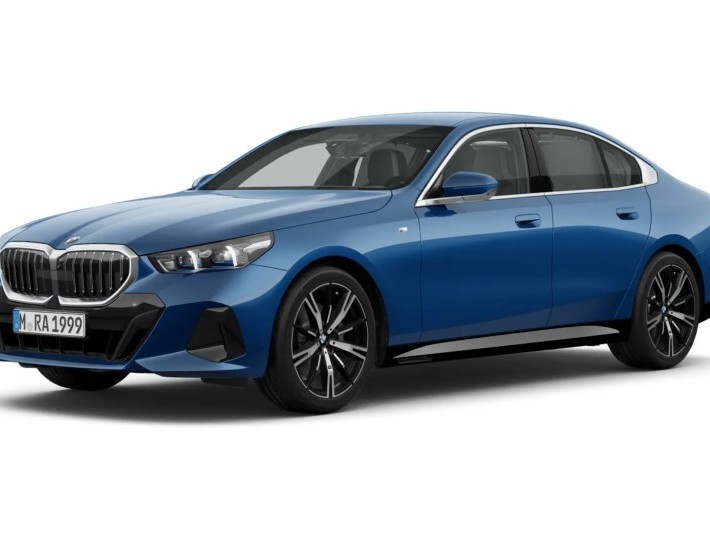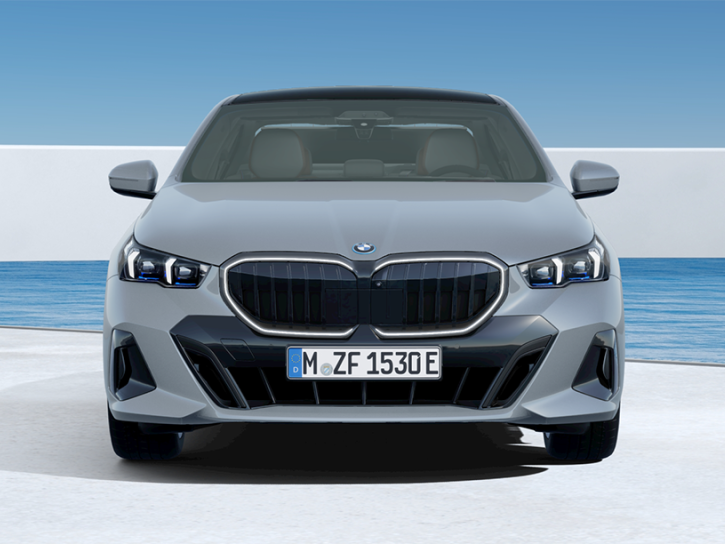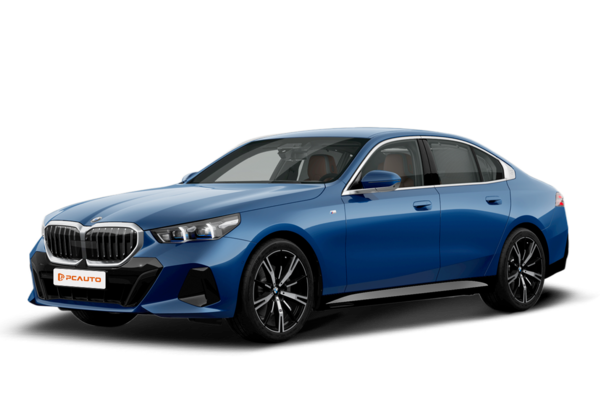Q
How tall is the BMW 5 Series 2024?
The 2024 BMW 5 Series stands at 1515 millimeters (around 1.515 meters) in height. This design strikes a balance between maintaining a sporty profile, providing ample headroom, and ensuring driving stability, making it well-suited for Malaysia's diverse driving scenarios. As a luxury midsize sedan, its height is comparable to key rivals like the Mercedes-Benz E-Class or Audi A6. However, BMW's focus on a lower center of gravity enhances handling, which is particularly noticeable on Malaysia's winding mountain roads or city expressways. It's worth noting that this height figure is based on the standard suspension setup; opting for the adaptive air suspension might result in minor variations. For Malaysian buyers, German luxury carmakers typically consider Asian body proportions when designing their vehicles, so even with the panoramic sunroof, the cabin doesn't feel cramped. Japanese competitors in the same class, such as the Lexus ES, tend to be slightly taller by 20-30 millimeters. But German brands place a stronger emphasis on balancing height with aerodynamic efficiency, which is one factor contributing to the 5 Series' impressive 0.27 drag coefficient. When considering a purchase, it's advisable to visit a local BMW dealership for a test drive, as the seat height adjustment range can also significantly impact subjective space perception.
Special Disclaimer: This content is published by users and does not represent the views or position of PCauto.
Related Q&A
Q
How many miles can a BMW Series 5 last?
The BMW 5 Series, as a luxury sedan, can typically clock up 200,000 to 300,000 kilometers or more with proper care and maintenance. Its actual lifespan really hinges on your driving habits, how often you service it, and let's not forget Malaysia's road conditions and climate. Sticking to regular oil changes, swapping out filters, maintaining the brake system, and following the manufacturer's recommended service schedule will definitely help your 5 Series go the distance. Malaysia's hot and humid weather can take a toll on rubber components and electronics, so it's smart to keep an eye on those parts. Also, using genuine or high-quality parts and steering clear of cheap engine oil will go a long way in keeping your car performing well and reliable. The 5 Series is known for its solid engineering and durability, and plenty of owners have kept theirs running strong for over 15 years with good upkeep. If you're planning to hold onto it for the long haul, I'd recommend regular professional check-ups at authorized service centers to make sure it stays in top shape.
Q
What is the diesel engine in the BMW 5 Series 2024?
The 2024 BMW 5 Series in the Malaysian market is expected to come with an upgraded B47 2.0-litre four-cylinder turbocharged diesel engine. Renowned for its efficiency and low emissions, this powerplant likely delivers between 190 to 200 horsepower and a robust 400 Nm of torque. Paired with the 8-speed Steptronic transmission, it strikes a solid balance between performance and fuel economy, making it a great fit for both long highway drives and city commutes around Malaysia. BMW's diesel tech focuses on clean efficiency, using common-rail injection and variable turbocharging to meet EU6d emission standards, while keeping maintenance costs relatively reasonable. If you're considering a diesel, it's worth keeping an eye on the Malaysian government's policies regarding diesel vehicles, like road tax and potential changes to fuel subsidies. That said, the diesel engine's strong torque really shines in tropical climates and hilly terrain. Rivals like the Mercedes E-Class or Audi A6 offer similar diesel options too, so it's smart to test drive and compare based on your personal driving style and budget.
Q
How to check mileage on 2024 BMW 5 series?
To check the mileage on a 2024 BMW 5 Series, start by turning on the vehicle. Then, use the multi-function buttons on the right side of the steering wheel or the iDrive controller on the center console to navigate to the instrument cluster menu. Look for the "Vehicle Info" or "Trip Data" section, where you’ll find the "Mileage" display showing both total and trip-specific mileage clearly. For Malaysian owners, BMW’s Digital Cockpit system is pretty intuitive, but if you run into display issues, just refer to the owner’s manual or reach out to your local authorized BMW service center for help. Also, checking your mileage regularly isn’t just about tracking usage—it helps you plan maintenance too, since BMW’s Condition-Based Service (CBS) system automatically calculates when your next service is due based on mileage and vehicle condition. One thing to keep in mind, especially with Malaysia’s hot and humid climate: besides keeping an eye on mileage, make sure to regularly check your tire wear and oil condition to keep your car running at its best.
Q
How often should I change the oil in my BMW 5 Series?
For the oil change frequency of the BMW 5 Series, it's best to stick to BMW's official maintenance schedule, which typically recommends changing the oil every 12 months or 10,000 to 15,000 kilometers, whichever comes first. The exact interval can vary depending on the model year and engine type—for instance, turbocharged models might need more frequent changes. Malaysia's hot and humid climate can speed up oil degradation, so if you often drive in congested city traffic or push the car hard, consider shortening the interval to 8,000 to 10,000 kilometers to keep the engine properly lubricated. When choosing oil, always go for BMW-approved fully synthetic oils meeting the LL-01 or LL-04 standards; these handle high temperatures better and offer superior engine protection. Regularly checking the oil level and condition is also crucial—if the oil looks black or has too many impurities, change it early even if you haven't hit the maintenance deadline. Additionally, BMW's CBS (Condition Based Service) system intelligently suggests service times based on driving habits and vehicle condition, which you can check through the iDrive system. Proper oil maintenance not only extends engine life but also improves fuel efficiency and driving smoothness, so don't skip those regular changes.
Q
How much oil does a 2024 BMW 5 Series take?
The engine oil capacity of the 2024 BMW 5 Series (G60) varies depending on the engine model. The common 2.0-liter B48 four-cylinder turbo engine requires approximately 5.25 liters of oil, while the 3.0-liter B58 six-cylinder turbo engine needs around 6.5 liters. Always refer to the vehicle manual or BMW Malaysia's official recommendations for the exact figure. Given Malaysia's hot climate, it's advisable to use BMW-approved fully synthetic oils meeting LL-04 or LL-17FE specifications, such as 5W-30 or 0W-20 viscosity grades. These oils handle high-temperature conditions better and help extend engine life. Regular oil level checks are especially crucial for turbocharged engines since oil not only lubricates but also cools the turbocharger. If the oil warning light appears on the dashboard, check immediately. Notably, overfilling with oil can actually cause reduced performance and carbon buildup issues, so it's best to confirm the oil level using the electronic dipstick or have a professional technician do it. For owners who primarily drive at low speeds in urban areas, consider shortening the service interval to every 10,000 kilometers or 12 months to keep the engine in optimal condition.
Q
What engine is in the BMW 5 Series 2024?
The 2024 BMW 5 Series offers a diverse range of engine options in the Malaysian market to cater to different consumer needs. The petrol variants are expected to come with a 2.0-liter four-cylinder turbocharged engine (B48) and a 3.0-liter inline-six turbocharged engine (B58), both paired with a 48V mild-hybrid system to enhance fuel efficiency and power response. As for the diesel version, it might be equipped with a 3.0-liter inline-six turbocharged diesel engine (B57), also integrated with mild-hybrid technology, making it ideal for users who prioritize efficient long-distance driving. Additionally, the plug-in hybrid model 530e is projected to feature a combination of a 2.0T engine and an electric motor, with an all-electric range of approximately 50-60 kilometers, suitable for urban commuting. It's worth noting that BMW's engine technology has long been renowned for its modular design and efficient power delivery, such as TwinPower Turbo and Valvetronic variable valve technology, which ensure smooth power output and fuel efficiency. For Malaysian consumers, when making a choice, they can consider the sporty performance of the petrol version or the fuel economy of the diesel version based on their daily driving needs. At the same time, there's no need to worry about the engine's heat dissipation and fuel adaptability to the local climate and road conditions, as BMW's global tuning has already taken into account the characteristics of tropical environments.
Q
How big is the gas tank on a 2024 BMW 5 Series?
The 2024 BMW 5 Series has a fuel tank capacity of approximately 68 liters, a design that delivers an extended driving range, perfect for Malaysia's long-distance driving needs. As a luxury sedan, the 5 Series' fuel tank size strikes a balance between performance and fuel efficiency, paired with efficient engine technology to reduce the hassle of frequent refueling. For Malaysian users, this tank capacity is practical for both city commutes and inter-state trips. Additionally, the 5 Series comes equipped with an advanced fuel management system that further optimizes fuel consumption. If you're after even better fuel efficiency, the plug-in hybrid variant is worth considering, offering extra energy-saving benefits in all-electric mode. All in all, the 2024 BMW 5 Series' fuel tank design balances practicality and technology, living up to the brand's usual luxury standards.
Q
How much is the 2024 BMW X5 series?
The 2024 BMW X5 lineup in Malaysia comes with varying price tags depending on the model and specs. The base X5 xDrive40i M Sport starts at around RM 500,000, while the high-performance X5 M60i xDrive pushes close to RM 700,000 – though actual prices might shift a bit based on optional extras or ongoing promotions. Under the hood, this luxury SUV packs either a 3.0-liter inline-six or a 4.4-liter V8 turbo engine, paired with a 48V mild-hybrid system. That means you get plenty of power without sacrificing fuel efficiency, and with standard xDrive all-wheel drive plus adaptive suspension, it’s ready for Malaysia’s mix of road conditions. Local buyers also score a 5-year unlimited mileage warranty and free regular servicing from BMW Malaysia. Toss in the signature premium interior and the latest iDrive 8.5 system, and the X5 lineup is a solid contender in the luxury SUV space. If you’re watching the budget, keep an eye on the official certified pre-owned program or check out financing options to ease the upfront cost.
Q
How much does a BMW 5 Series 2024 weight?
The weight of the 2024 BMW 5 Series varies by model and configuration, generally ranging from 1,700 kg to 1,900 kg, depending on the powertrain (such as fuel-powered or plug-in hybrid versions) and optional equipment (like all-wheel drive systems, luxury packages, etc.). For Malaysian consumers, this car's weight is above average among luxury sedans in its class, but BMW ensures a balance between driving agility and fuel efficiency through the use of lightweight materials (such as aluminum body components) and efficient powertrain combinations. It's worth noting that vehicle weight affects handling feel and fuel consumption, but the BMW 5 Series has always been known for its precise chassis tuning and power response, delivering an excellent driving experience even with a heavier body. Malaysia's hot and rainy climate places high demands on vehicle cooling and braking systems, and the BMW 5 Series' weight distribution and cooling design have been optimized for such environments to ensure long-term reliability. If you're considering purchasing this car, it's recommended to test drive it at a local authorized dealership to personally experience whether its dynamic performance meets your needs.
Q
What is the difference between the 2024 and 2025 BMW 5 Series?
There are some differences between the 2024 and 2025 BMW 5 Series models. In terms of pricing, the 2024 520i starts at RM 332,800, with the 520i M Sport variant coming in at RM 349,800. The 2025 530i M Sport, on the other hand, is priced at RM 399,800.
Under the hood, the 2024 520i engines deliver either 210PS or 208PS, while the 2025 530i M Sport ups the ante with a 258PS powerplant. Performance-wise, the 2024 models top out at 230km/h and sprint from 0-100km/h in 7.5 seconds. The 2025 model pushes that top speed to 250km/h and shaves the 0-100km/h time down to just 6.2 seconds.
Looking at the specs, some 2024 trims have rear seats with manual adjustments or fixed configurations, whereas the 2025 model gets a 40:20:40 split-folding rear seat setup. Audio systems also see an upgrade: most 2024 models feature Harman Kardon speakers, while the 2025 model steps up to a Bowers & Wilkins surround sound system.
Additionally, the 2025 5 Series hit dealerships on March 13, 2025, and comes with a 2-year unlimited mileage warranty. The 2024 models first arrived on September 2, 2024.
Latest Q&A
Q
How many Litres per 100km does a Toyota Yaris take?
According to official Toyota data, the fuel consumption of the Toyota Yaris varies by model and powertrain configuration. The 1.5L petrol version currently sold in Malaysia has a combined fuel consumption of approximately 5.2 to 5.5 liters per 100 kilometers. The actual figure can vary depending on driving habits, road conditions, and vehicle maintenance. When driving in urban areas, fuel consumption may rise to around 6.0 liters per 100 kilometers, while on highway cruises, it can drop to 4.8 liters per 100 kilometers. For Malaysian consumers, the Yaris, as an economical hatchback, offers quite competitive fuel efficiency, making it especially suitable for city commuting. Additionally, Toyota's Dual VVT-i technology effectively optimizes fuel efficiency. It is recommended to perform regular maintenance such as replacing the air filter and using the recommended engine oil to maintain optimal fuel consumption. Furthermore, keeping proper tire pressure and avoiding sudden acceleration can further improve fuel economy.
Q
What is the Yaris comparable to?
In the Malaysian market, the Toyota Yaris is primarily positioned as a B-segment hatchback, with direct competitors including the Honda Jazz, Mazda 2, and Nissan Almera. These models also highlight affordability, nimble handling, and urban commuting convenience as their key selling points. Thanks to Toyota's reputation for reliability and low maintenance costs, the Yaris holds strong resale value in the local used car market, making it especially suitable for budget-conscious young buyers who value brand credibility. Notably, since the launch of the 2023 Yaris Cross in Southeast Asia, its crossover variant has also attracted some buyers who were originally considering the HR-V or Raize. This model derivative strategy demonstrates Toyota's precise grasp of niche markets. Technically, while the 1.5L Dual VVT-i engine in the Yaris doesn't stand out in terms of power figures, when paired with a CVT transmission, it achieves fuel efficiency of over 18km/L—an especially crucial feature given Malaysia's persistently high fuel prices. Potential buyers are advised to test drive the Perodua Myvi, a same class model. Although positioned under a different brand, both offer unique strengths in space utilization and local adaptation. The final choice should ultimately depend on personal brand preference and actual usage scenarios.
Q
Is the 2021 Yaris easy to park?
The 2021 Toyota Yaris is a great little city car for Malaysia. Its compact size and nimble handling make parking a breeze – under 4 meters long with a tight turning radius, it slides into parallel spots or reverse parks easily, even in cramped parking lots or along narrow roads. Plus, some trims come with a reverse camera and parking assist, which really boost convenience and safety when squeezing into spaces. In Malaysia's typical congested city environments like KL or Penang, the Yaris's small footprint definitely takes the stress out of driving. And let's not forget, small cars usually nail fuel efficiency – a big plus for Malaysian drivers stuck in constant traffic. If you're zipping around the city a lot, a small car like the Yaris just makes more sense than a bigger vehicle. Of course, parking skills and knowing your car's dimensions matter too – new owners should practice a bit to get the most out of the Yaris's handy size.
Q
What is the mileage limit for a Toyota Yaris?
The Toyota Yaris, known as a practical and economical car, its mileage limit mainly depends on the vehicle's maintenance condition and usage environment. Generally speaking, a properly maintained Yaris can easily clock over 200,000 kilometers or even more. The actual lifespan in terms of mileage is also closely tied to driving habits, road conditions, and regular upkeep. In Malaysia, with its hot and rainy climate, it's advisable for owners to check the engine oil, cooling system, and tires more frequently to ensure the vehicle runs steadily for the long haul. Besides, the Yaris's engine and transmission are built to be pretty durable, but regularly replacing wear-and-tear parts like the timing belt and spark plugs can significantly extend its service life. For consumers planning to buy a used Yaris, it's recommended to confirm the vehicle's actual mileage and mechanical condition through professional inspection to avoid issues caused by improper maintenance from previous owners. Overall, as long as you pay attention to maintenance, the Yaris can maintain reliable performance even in Malaysia's hot and humid environment.
Q
Is the 2021 Yaris reliable?
The 2021 Toyota Yaris has delivered an overall solid reliability performance in the Malaysian market. Under the hood, it’s packing a 1.5L Dual VVT-i engine that serves up smooth power delivery and excellent fuel efficiency—perfect for both the daily city grind and longer highway drives around here. Toyota’s TNGA-B platform really shines here, boosting body rigidity and nailing the suspension tuning, which makes for some pretty impressive handling stability.
From what owners are saying, day-to-day maintenance costs are reasonable, and Toyota’s 5-year unlimited mileage warranty takes a lot of the long-term ownership worry out of the equation. Most issues reported are minor, occasional glitches with the electronics, while major mechanical bits like the transmission and engine have shown low failure rates.
One thing that stands out is its above-average used car resale value in its class—definitely a big plus for Malaysian buyers who care about that. If you’re looking at a used 2021 Yaris, make sure to check the brake system and battery condition closely; those tend to wear faster in our tropical climate. And when it comes to regular servicing, keeping an eye on the cooling system and AC filter will help it hold up better in the local heat and humidity.
All in all, this car hits the spot for Malaysian drivers who want something economical, practical, and backed by a strong brand after-sales network.
View MoreRelated News

BMW 5 Series Review: Luxury Shaped by Cutting-Edge Tech
JamesMay 7, 2025

The official price of the brand-new BMW 5-Series (G60) has been announced, 3,779,000-3,949,000 Thai Baht
Kevin WongMar 11, 2024

Neue Klasse platform's first mass-produced vehicle, the all-new BMW iX3 makes its debut, looks just like a concept car
LienSep 8, 2025

BMW X5 will become BMW's first model equipped with a hydrogen fuel cell, with a range of 504 kilometers
JamesSep 8, 2025

BMW's all-new iX3 to be unveiled on September 5, built on the Neue Klasse platform
Kevin WongSep 1, 2025
View More

















Pros
Cons